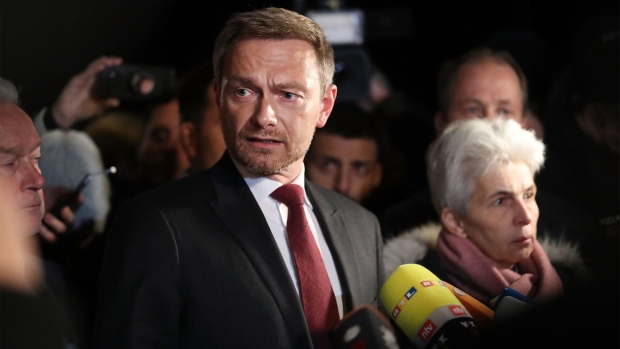Oct 31, 2021
Germany’s Finance Minister-in-Waiting Demands Hard Line From ECB
, Bloomberg News

(Bloomberg) -- Sign up for the New Economy Daily newsletter, follow us @economics and subscribe to our podcast.
Christian Lindner, the pro-business leader pushing to become Germany’s next finance minister, warned the European Central Bank must resist the temptation to help out highly indebted euro countries as inflation accelerates.
In comments posted on social media, Lindner took aim at Germany’s political class for “underestimating” the dangers of inflation after getting drawn into a fight with two American economists over his determination to constrain government borrowing.
“If the ECB gets caught up in the fiscal policy of heavily indebted countries, it would have little means to fight inflation,” Lindner wrote Saturday. Containing price increases is a social responsibility and letting inflation run out of control leads to poverty, he argued.
Lindner’s party, the FDP, is pushing for limits on spending in the three-way coalition talks that will determine the direction of Germany’s economic policy for the next four years. While the Social Democrats and, especially, the Greens want a more expansive fiscal policy to drive the transition to a low carbon economy, 42-year-old Lindner argues that it is risky to pile up too much public debt.
He has also said he wants control of the finance ministry as a condition for joining the next government and is aiming to seal the deal as the coalition horse-trading plays out in Berlin over the next few weeks.
Read more: Austria Minister Losing Sleep Over Inflation Urges ECB Rate Hike
Nobel laureate economist Joseph Stiglitz and Adam Tooze, a professor of history at Columbia University, warned in the weekly newspaper Zeit that Lindner’s views on public finances are “conservative cliches” that would prevent Germany getting the investment it needs. They want the Greens co-leader, Robert Habeck, to be finance minister instead.
During the first phase of the coalition talks, the three parties agreed to stick to the constitutional debt brake which limits new borrowing to 0.35% of gross domestic product. But they are at odds over how far they should go in using loopholes and off-balance-sheet structures to raise additional funds.
©2021 Bloomberg L.P.






